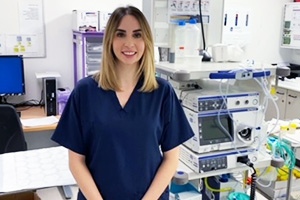Gemma Norris talks about working in Gastrointestinal Physiology
Gemma is a Clinical Scientist by registration and initially trained as a Biomedical Scientist.
- Programme
- STP
- Role
- Alumni
Following my training, I wished to pursue more of a patient-facing role and applied for the Scientist Training Programme (STP), obtaining a place within the specialty of GI Physiology. After completion of the STP in 2015, I began working as a Band 7 Clinical Scientist, within a small GI Physiology unit. Through professional networking within this role, I was able to provide advice and support to St Helens and Knowsley Teaching Hospitals NHS Trust, which enabled them to establish their own in-house GI Physiology service, providing specialist diagnostic investigations including:
- Oesophageal manometry
- Ambulatory 24hr pH/impedance studies
- Anorectal manometry
- Small bowel capsule endoscopy
- Patency capsule
- Cytosponge
In 2018, I was successful in obtaining a position as a Clinical Scientist and GI Physiology Service Lead at St Helens and Knowsley Teaching Hospitals NHS Trust.
In October 2020, the Trust supported me to undertake the Health Education England Clinical Endoscopy Training programme. This is a 30-week programme which trains registered health professionals to perform safe diagnostic procedures in Upper or Lower GI Endoscopy. During the training period, trainees are required to complete a minimum of two training lists per week, which is supported by 20 hours study time per week. Academic teaching is provided through a university-accredited programme to support the skills obtained within clinical practice. During the training, each candidate must complete a reflective training portfolio, one assessed clinical case study and an e-learning package. From a practical point of view, a minimum of 200 diagnostic procedures must be completed in addition to the Joint Advisory Group (JAG) Basic Skills Course, prior to application for independent practice.
I chose to complete my endoscopy training in diagnostic oesophagogastroduodenoscopy (OGD) and was supported by Dr David McClements, Endoscopy Training Lead and Clinical Lead for the GI Physiology Service at St Helens and Knowsley Teaching Hospitals NHS Trust.
Clinical Scientists specialised in GI Physiology form a relatively small community. I was not aware of any scientific colleagues who had previously completed training within endoscopy and as such felt a responsibility to my Trust and to our patients; to appropriately demonstrate the clinical skills needed to ensure a high level of competence within this dual role. The demand for endoscopy within the UK continues to rise and I would urge other Trusts to consider utilising their GI physiology workforce to assist in the delivery of endoscopy services; particularly during the recovery phase of the pandemic. GI Physiologists have a high level of both anatomical and physiological knowledge. In addition to this, we regularly perform invasive, diagnostic procedures which require good technical and personal skills, which can be easily applied to the role of an endoscopist.
Initially, I was quite aware that my experience within acute patient management was somewhat limited; however, through the protected study time provided to me through the HEE course, I was able to arrange additional training and tailor this as appropriate to my needs. The academic teaching on the course was especially useful to underpin the practical elements of training and this was brought together regularly during meetings with my clinical supervisor. Since completing my endoscopy training I now feel more competent and confident as a clinician. I feel that I have further improved within my role as a GI Physiologist, and can provide patients with more detailed advice surrounding their diagnoses and further management. In addition to this, during endoscopic assessment, I have been able to identify patients whom are suitable for physiological investigation, and facilitate this referral swiftly. I feel that endoscopy training is a natural step in the professional development of GI Physiologists and I am extremely grateful to the Trust and to my clinical leads for providing me with the opportunity take on this challenge. The assistance and encouragement of my colleagues was invaluable throughout my training and I was always made to feel comfortable and supported, both as a trainee and as a newly qualified endoscopist. This allowed me to grow in confidence and resulted in an extremely enjoyable training experience.
In the future, as my training progresses through HSST, I would like to further extend my skills to incorporate therapeutic endoscopy in addition to non-medical prescribing; if/when this becomes a possibility.
The Trust is now supporting Gemma to complete the Higher Specialist Scientist Training programme (HSST) with the National School of Healthcare Science. This is a bespoke, five-year, workplace-based training programme, supported by a doctoral level academic award and will provide Gemma with the opportunity to become eligible to apply for a consultant clinical scientist post in the future.
